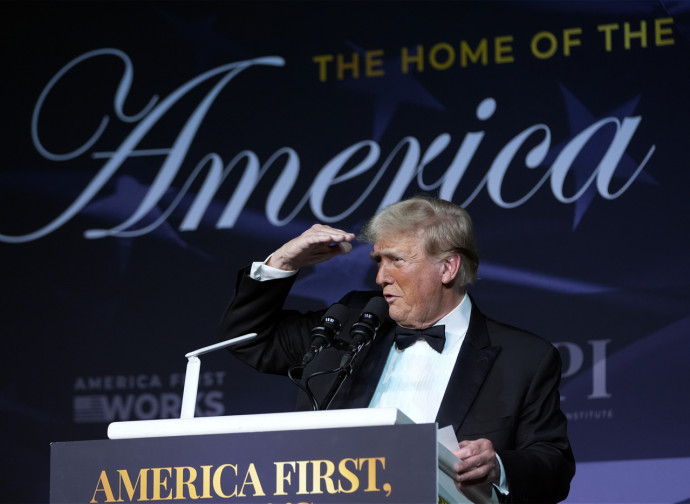Trump's aims on neighbors: symptom of a multipolar World
Provocative Trump's claims of future U.S. influence and control over the Panama Canal, Greenland, and even Canada, jokingly referred to as a "State of the Union". This is not a joke. This is the premise of a new strategy for a multipolar World.

In recent days, some "strange" statements by U.S. President-elect Donald Trump have captured the attention of the American and world media: provocative claims of future U.S. influence and control over the Panama Canal, Greenland, and even Canada, jokingly referred to as a "State of the Union" of which Prime Minister Justin Trudeau would be the "governor."
The speeches, which of course provoked bitter polemical exchanges, have mostly been dismissed as boutades typical of the tycoon's exuberant personality, or interpreted as heralding a trade tug-of-war over tariffs and duties. But perhaps it would be appropriate to understand them in a broader context, in light of global balances that have shifted profoundly in recent years, and as components of an overall foreign policy strategy of the next U.S. administration.
Indeed, the three cases cited, in addition to the obvious link to the announced new protectionist crackdown of "Trumpenomics," have another important element in common: they hint at the framework of an attempt by the United States to reassert unchallenged hegemony on the American continent, in the sign of a kind of updated re-edition of the "Monroe Doctrine" that inspired the country's foreign policy for much of the 19th century and up to the intervention in World War I decided by Woodrow Wilson.
In fact, the barbs aimed at Ottawa, together with the threat of high tariff barriers, seem to be functional to weaken the already shaky political position of the progressive Prime Minister Trudeau and to favor the victory in the next elections of the Canadian Conservative Party, whose leader Pierre Pollevre is a populist libertarian in remarkable harmony with Trumpian positions. Together with the iron axis already established by Trump with the libertarian Argentinean president Javier Milei, the pressure on Canada sets up a possible liberal-conservative bloc led by Washington between the North and the South of the continent, as opposed to the leftist liaison between Lula's Brazil and Maduro's Venezuela, which has excellent relations with China and Russia.
From this perspective, it is also easy to understand the spotlight that Trump suddenly put on the Panama Canal before entering the White House. Administered by the United States before being handed over to the Panamanian government by Jimmy Carter, the canal now sees commercial ship traffic, 70 percent of which is destined for the United States. But the local government, while imposing high tariffs on the transit of these goods, is, like that of Honduras, forging increasingly friendly relations with China. Trump's warnings to Panama are thus an announcement of an attempt to counter Beijing's expanding economic influence in the Americas, particularly in the Caribbean, which has also translated into the construction of much major infrastructure in recent years; and a claim to a vital communications hub for American interests "in its backyard."
As for Greenland, Trump ascribes to it a crucial strategic importance for security reasons, since it represents a physical link between America and Europe and a "window" to the North Sea. At a time when internal relations within the Atlantic Alliance are being reconfigured, with Trump's calls for European allies to commit much greater autonomous resources to defense, strengthening control over the large Arctic island-where there is already an important U.S. military base - could represent a more strictly national line of defense for the new U.S. administration, and also serve to admonish Russia, in the context of upcoming, possible peace talks, that Washington has no intention of disengaging militarily from the European front. From an economic point of view, Greenland's large natural resources - oil and rare minerals - would be a key building block to strengthen the policy of American independence in the field of raw materials, which was one of the qualifying points of Trump's electoral program, to "decouple" supply chains by concentrating them in "friendly" territories and to avoid as much as possible dependence on Beijing, Moscow or areas of the world linked to them.
In sum, these ballons d'essai launched by the next president - even more so when coupled with the tough tug-of-war already initiated with the Mexican government over the double whammy of illegal immigration and trade tariffs - point to a clear tendency on the part of the next administration to reshape foreign policy, starting not from a global projection but from a very sharply defined U.S. sphere of influence.
Trump is apparently convinced that the current world disorder - with all the conflicts and persistent risks of destabilization that it entails - can only be overcome, on the basis of a realistic assessment, in the perspective of a multipolar equilibrium characterized by the coexistence of zones of influence and hegemony of different powers, in the form of a renewed "system" characterized by mutual recognition and a sufficient degree of deterrence, in which crisis fault lines can be resolved through pragmatic compromise solutions. A system, however, in which the United States, thanks to its superiority in the high-tech digital economy, aerospace and AI research, as well as its continued military supremacy, is able to maintain an undisputed authoritative role and the ability to effectively protect its vital interests.
This is a design diametrically opposed to the line pursued by recent democratic administrations, characterized by the sharp contradiction between ideological yearnings for Western global hegemony and de facto concessions to fiercer competitors, between claims to direct the governance of the planet and the constant feeding of different factors of destabilization.
